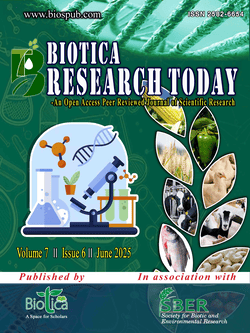
From Trash to Treasure: The Story of Fish Proteasomes
V. Subashini
ICAR-Central Institute of Fisheries Education, Mumbai, Maharashtra (400 061), India
S. Sangeetha
ICAR-Central Institute of Fisheries Education, Mumbai, Maharashtra (400 061), India
Diganta Dey
ICAR-Central Institute of Fisheries Education, Mumbai, Maharashtra (400 061), India
Annam Pavan Kumar*
ICAR-Central Institute of Fisheries Education, Mumbai, Maharashtra (400 061), India
DOI: https://doi.org/10.54083/BRT/7.6.2025/165-167
Keywords: Aquaculture, Fish biology, Proteasomes, Stress adaptation
Abstract
Proteasomes, once regarded as cellular waste-disposal units, are now recognised as regulators of fish immune function, stress adaptation and protein homeostasis. This article explores the structure and function of the proteasome, the targeted protein degradation by the ubiquitin-proteasome system (UPS) and its regulation in response to environmental stressors. These molecular machines control antigen presentation, starvation, hypoxia, oxidative and heat stress and oocyte maturation in fish. They act as stress biomarkers and disease resistance enhancers in aquaculture. Targeted proteasomal degradation of proteins is made possible with recent technologies like PROTACs (Proteolysis Targeting Chimaeras) that could help in precision aquaculture.
Downloads
not found
Reference
Krishnan, R., Kim, J.O., Jang, Y.S., Oh, M.J., 2021. Proteasome subunit beta type-8 from sevenband grouper negatively regulates cytokine responses by interfering with NF-κB signalling upon nervous necrosis viral infection. Fish Shellfish Immunology 113, 118-124. DOI: https://doi.org/10.1016/j.fsi.2021.04.004.
Kodzik, N., Ciereszko, A., Szczepkowska, B., Malinowska, A., Dietrich, M.A., 2024. Comparative proteomic analysis of the ovarian fluid and eggs of Siberian sturgeon. BMC Genomics 25, 451. DOI: https://doi.org/10.1186/s12864-024-10309-y.
Li, J., Li, Z., Li, X., Li, Z., Song, Y., Yuan, L., Wang, Y., Yan, R., Lai, F., Wang, J., Xiao, W., 2025. MYLIP attenuates hypoxia tolerance by inducing K27-linked polyubiquitination and subsequent proteasomal degradation of HIF-α. Communications Biology 8, 774. DOI: https://doi.org/10.1038/s42003-025-08200-x.
Li, Q.Q., Zhang, J., Wang, H.Y., Niu, S.F., Wu, R.X., Tang, B.G., Wang, Q.H., Liang, Z.B., Liang, Y.S., 2023. Transcriptomic Response of the Liver Tissue in Trachinotus ovatus to acute heat stress. Animals 13(13), 2053. DOI: https://doi.org/10.3390/ani13132053.
Nemova, N.N., Kantserova, N.P., Lysenko, L.A., 2021. The traits of protein metabolism in the skeletal muscle of teleost fish. Journal of Evolutionary Biochemistry and Physiology 57, 626-645. DOI: https://doi.org/10.1134/S0022093021030121.
